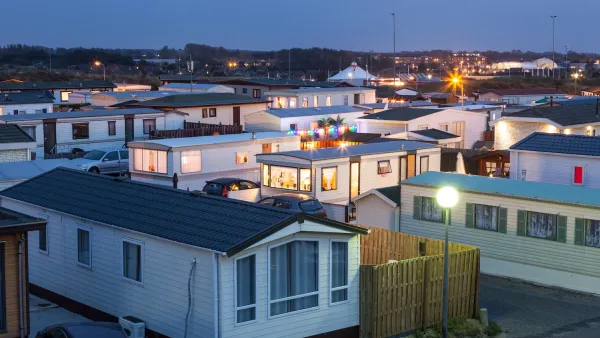Homeownership is slipping out of reach for many Americans, caused largely by the lack of affordable housing inventory. There is a solution to the inventory shortage that many buyers, advocates and policymakers are overlooking: Manufactured Housing.
Doug Ryan, Rooflines blogger and director of affordable homeownership initiatives at the Corporation for Enterprise Development (CFED), dispels some of the myths about manufactured housing and suggests the promise it holds in offering affordable homeownership to many families. Manufactured homes of the present are no longer mobile trailers that trap inhabitants in concentrated pockets of poverty. As Ryan puts it, "[manufactured housing] is housing that can appreciate, blend into existing and planned neighborhoods and become a meaningful part of a region’s housing assets. And it is less expensive, less wasteful and quicker to develop than other housing options."
What many do not know is that manufactured housing costs nearly half of what site built units costs. In addition, the housing is about 60% the size of standard homes, offering a less costly solution for thousands of families locked out of the new housing market.
Ryan is sure to state that manufactured housing is only part of a solution to the shortage in affordable units in the housing stock. And, it comes with its own set of challenges including the chattel loans that are often used to finance these homes and how they severely reduce the asset building potential of manufactured housing. But with such a shortage of available units and an even greater demand for the units in this resurgent market, policymakers, planners, advocates, and neighborhood activists need to start examining nuanced ideas for solving the problem.
FULL STORY: Manufactured Housing Deserves a Second Look

Planetizen Federal Action Tracker
A weekly monitor of how Trump’s orders and actions are impacting planners and planning in America.

Maui's Vacation Rental Debate Turns Ugly
Verbal attacks, misinformation campaigns and fistfights plague a high-stakes debate to convert thousands of vacation rentals into long-term housing.

Restaurant Patios Were a Pandemic Win — Why Were They so Hard to Keep?
Social distancing requirements and changes in travel patterns prompted cities to pilot new uses for street and sidewalk space. Then it got complicated.

In California Battle of Housing vs. Environment, Housing Just Won
A new state law significantly limits the power of CEQA, an environmental review law that served as a powerful tool for blocking new development.

Boulder Eliminates Parking Minimums Citywide
Officials estimate the cost of building a single underground parking space at up to $100,000.

Orange County, Florida Adopts Largest US “Sprawl Repair” Code
The ‘Orange Code’ seeks to rectify decades of sprawl-inducing, car-oriented development.
Urban Design for Planners 1: Software Tools
This six-course series explores essential urban design concepts using open source software and equips planners with the tools they need to participate fully in the urban design process.
Planning for Universal Design
Learn the tools for implementing Universal Design in planning regulations.
Heyer Gruel & Associates PA
JM Goldson LLC
Custer County Colorado
City of Camden Redevelopment Agency
City of Astoria
Transportation Research & Education Center (TREC) at Portland State University
Jefferson Parish Government
Camden Redevelopment Agency
City of Claremont




























